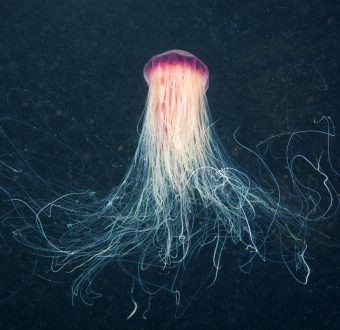Washington DC (February 14, 2023)—In the wake of baseless claims that offshore wind is a threat to whales, a new peer-reviewed report published today by the University of Exeter and Greenpeace Research Laboratories finds that the deep sea mining industry presents a very real threat to whale populations worldwide.
The study, which focuses on the overlap between cetaceans (such as whales, dolphins, and porpoises) and target sites for deep sea mining, especially in the Pacific Ocean, says deep sea mining could cause “significant risk to ocean ecosystems” with “long-lasting and irreversible” impacts, including risks to globally endangered species like blue whales. It further states that research is needed to assess threats to these mammals, particularly noise pollution from proposed mining operations.
Arlo Hemphill, Greenpeace USA’s Project Lead on Deep Sea Mining, said: “There has been a lot of talk about wind turbines and whale deaths, but there is no evidence whatsoever connecting the two. Meanwhile, the oceans face more threats now than at any time in history. This report makes it clear that if the deep sea mining industry follows through on its plans, the habitats whales rely on will be in even greater danger. Instead of opening up a new industrial frontier in the largest ecosystem on earth, we should be establishing ocean sanctuaries to protect biodiversity.”
Hemphill continued: “This month, world leaders have an opportunity to take a huge step in that direction by adopting a Global Oceans Treaty that puts conservation, not exploitation, at the heart of how governments approach the ocean. We hold the Biden administration accountable to be truly ambitious and ensure that this round of negotiations results in a strong treaty that helps to protect all life on our planet. We also need more countries to support a ban on deep sea mining. Governments cannot uphold their commitments to protect the oceans if they allow deep sea mining to start.”
The final negotiations for a Treaty will resume on Monday, February 20. A strong Treaty is essential to meeting the target of protecting 30% of the world’s oceans by 2030 agreed upon at COP15 in Montreal in December 2022. More than 50 High Ambition Coalition countries, including the United States, promised a UN Ocean Treaty in 2022. However, they failed to deliver as many of the self-proclaimed ocean champions from the Global North refused to compromise on key issues such as financing and monetary benefit sharing of the new treaty. Another failure to agree on a Treaty will jeopardize the 30×30 target – the minimum scientists say we need to allow the oceans to recover from decades of pollution and overfishing – just months after it was agreed upon.
Deep sea mining companies haven’t yet received permission to start mining on an industrial scale, but they are pressuring governments to get the green light to start mining commercially as early as July 2023. If permission is granted, giant machines working round the clock will invade fragile deep sea ecosystems, producing sounds at varying depths that could overlap with the frequencies cetaceans use to communicate. Up to 30 cetacean populations, including globally endangered species like blue whales, can be found in the Clarion Clipperton Zone, where 17 exploratory deep sea mining licenses have been granted.
Dr. Kirsten Thompson of the University of Exeter, one of the authors of the study, said: “Imagine if your neighborhood were suddenly disrupted by construction work that goes on 24/7, your life would change dramatically. Your mental health would be compromised, you might change your behavior to escape it. It’s no different for whales or dolphins.”
The Clarion-Clipperton Zone (CCZ) between Mexico and Hawaii in the Pacific Ocean provides habitat for at least 25 cetacean species, including dolphins and sperm whales, has become a key area of interest to mining companies aiming to extract metals and minerals from seafloor habitats. In addition, mining companies are also looking to target seabed mineral resources in areas around other important ecosystems like seamounts and deep sea hydrothermal vents.
The International Seabed Authority, the intergovernmental body charged with regulating deep sea mining in international waters, will meet in March and July in Kingston, Jamaica. At the last round of negotiations in November 2022, governments, including New Zealand, France, and Chile opposed commercial pressure to allow deep sea mining to start in 2023 and instead called for a precautionary pause. Since November, both France and Canada have taken decisions on deep sea mining in their national waters, with the French parliament voting for an outright ban on deep sea mining and Canada adopting a moratorium.
###
Notes
[1] The scientific paper, published in the journal Frontiers in Marine Science, is titled: Urgent assessment needed to evaluate potential impacts on cetaceans from deep seabed mining.
Contact: Tanya Brooks, Senior Communications Specialist at Greenpeace USA
(+1) 703-342-9226, [email protected]
Greenpeace USA is part of a global network of independent campaigning organizations that use peaceful protest and creative communication to expose global environmental problems and promote solutions that are essential to a green and peaceful future. Greenpeace USA is committed to transforming the country’s unjust social, environmental, and economic systems from the ground up to address the climate crisis, advance racial justice, and build an economy that puts people first. Learn more at www.greenpeace.org/usa




